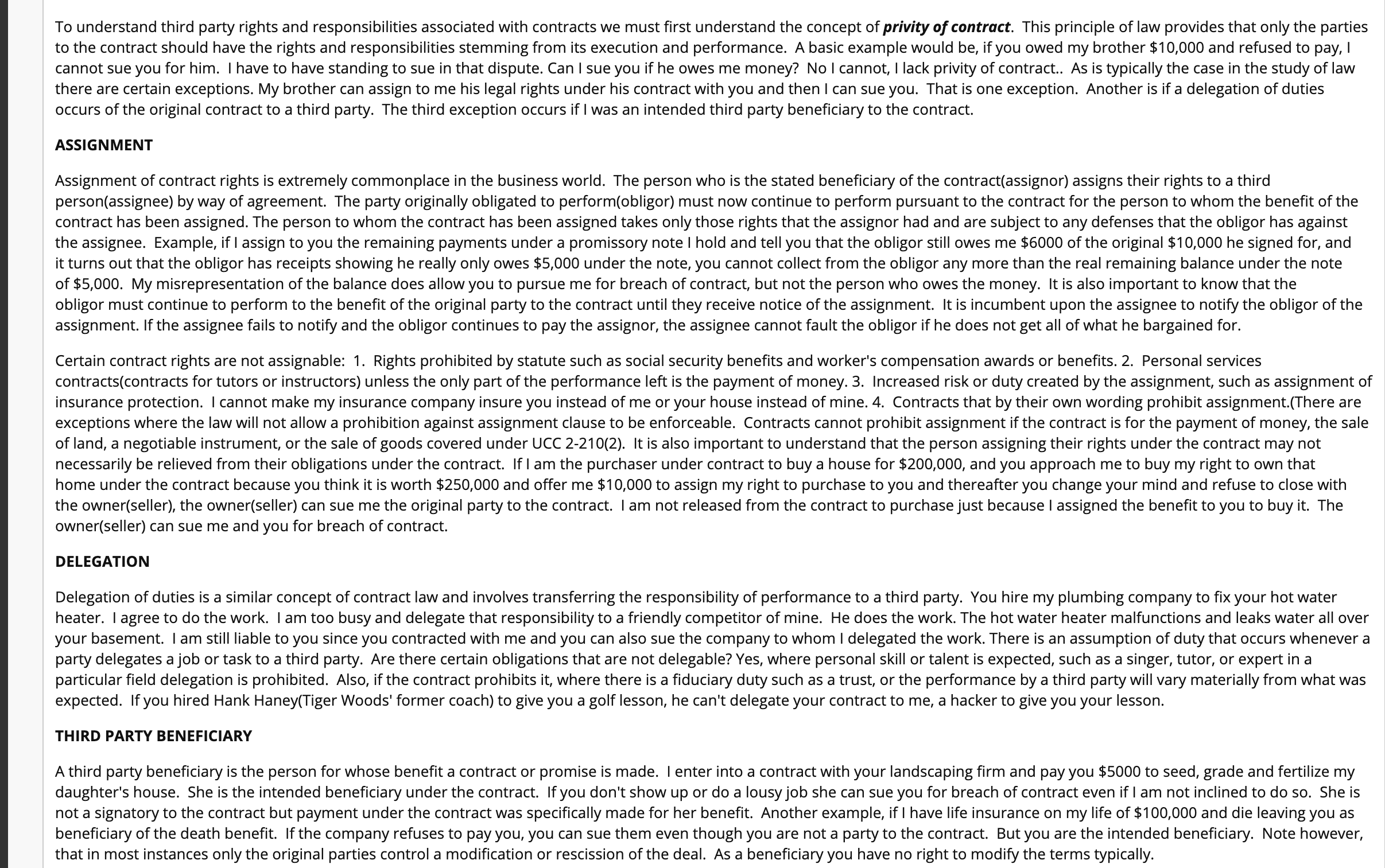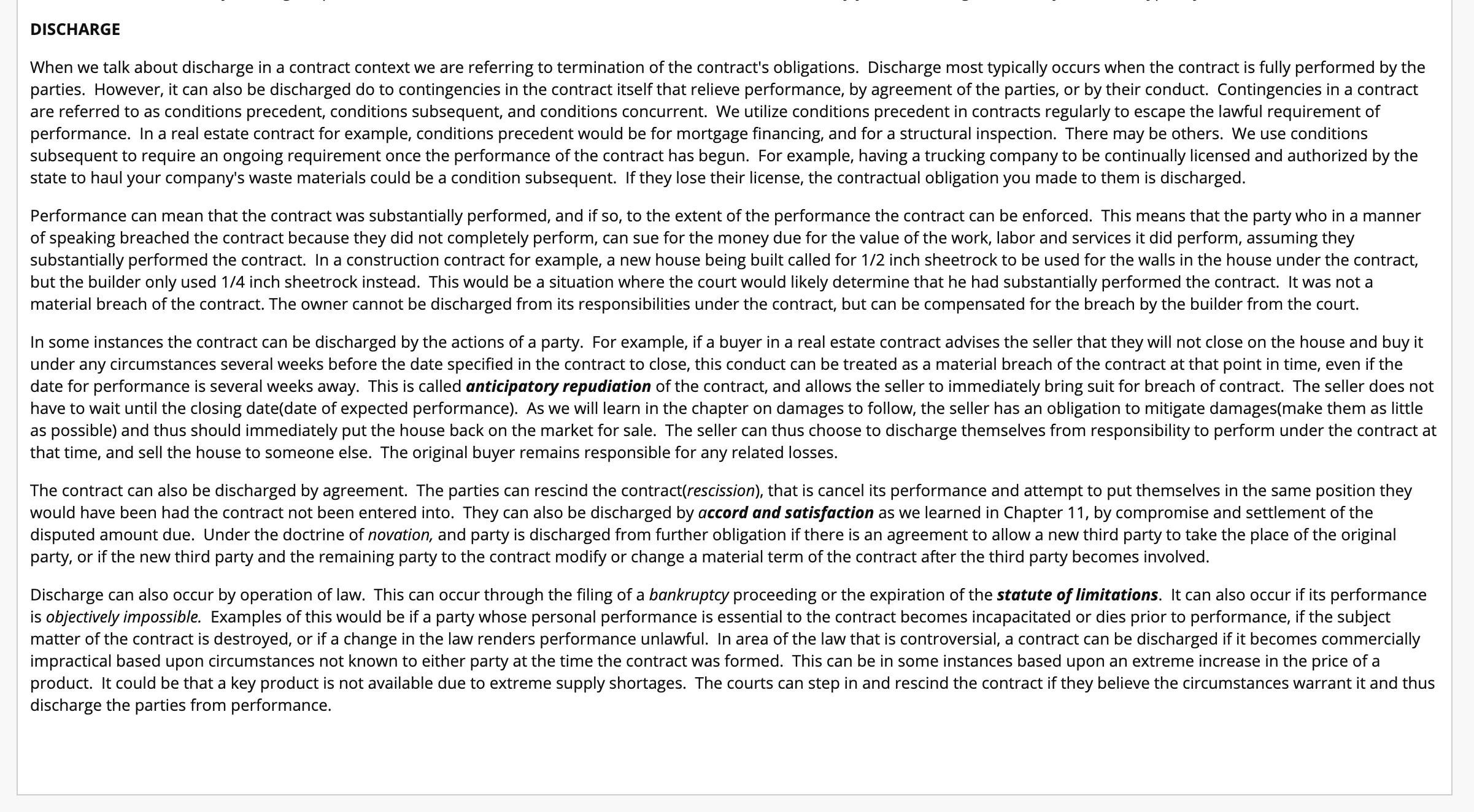I want to know someone 's opinion about this discussion is there any one can share it with me please?
Seller and Buyer enter into a real estate contract for the purchase and sale of a residence for $200,000.Buyer has inserted a mortgage contingency into the contract of $125,000, meaning if they are not able to get a mortgage loan of that amount to buy the house, the contract is cancelled.As part of the mortgage approval process an appraisal is performed on the house.The appraisal firm is hired by the bank and is paid for by the Buyer.They appraise the house for only $175,000.The Buyer is furious and wants to cancel the contract.Their bank will still let them borrow the money they said they needed to close the deal of $125,000.The Seller says the appraisal company is in error that their house is worth over $200,000, and wants to sue them for breach of contract if the Buyer backs out.They intend to sue the Buyer as well if they won't close the deal.Can they sue the appraisal company for breach of contract?Will they be successful in their suit against the Buyer?Explain your position.Can a realtor who put the deal together and was expecting a $14,000 commission sue for breach of contract?
To understand third party rights and responsibilities associated with contracts we must first understand the concept of privity of contract. This principle of law provides that only the parties to the contract should have the rights and responsibilities stemming from its execution and performance. A basic example would be, if you owed my brother $10,000 and refused to pay, I cannot sue you for him. I have to have standing to sue in that dispute. Can I sue you if he owes me money? No I cannot, I lack privity of contract.. As is typically the case in the study of law there are certain exceptions. My brother can assign to me his legal rights under his contract with you and then I can sue you. That is one exception. Another is if a delegation of duties occurs of the original contract to a third party. The third exception occurs if I was an intended third party beneficiary to the contract. ASSIGNMENT Assignment of contract rights is extremely commonplace in the business world. The person who is the stated beneficiary of the contract(assignor) assigns their rights to a third person(assignee) by way of agreement. The party originally obligated to perform(obligor) must now continue to perform pursuant to the contract for the person to whom the benefit of the contract has been assigned. The person to whom the contract has been assigned takes only those rights that the assignor had and are subject to any defenses that the obligor has against the assignee. Example, if I assign to you the remaining payments under a promissory note I hold and tell you that the obligor still owes me $6000 of the original $10,000 he signed for, and it turns out that the obligor has receipts showing he really only owes $5,000 under the note, you cannot collect from the obligor any more than the real remaining balance under the note of $5,000. My misrepresentation of the balance does allow you to pursue me for breach of contract, but not the person who owes the money. It is also important to know that the obligor must continue to perform to the benefit of the original party to the contract until they receive notice of the assignment. It is incumbent upon the assignee to notify the obligor of the assignment. If the assignee fails to notify and the obligor continues to pay the assignor, the assignee cannot fault the obligor if he does not get all of what he bargained for. Certain contract rights are not assignable: 1. Rights prohibited by statute such as social security benefits and worker's compensation awards or benefits. 2. Personal services contracts(contracts for tutors or instructors) unless the only part of the performance left is the payment of money. 3. Increased risk or duty created by the assignment, such as assignment of insurance protection. I cannot make my insurance company insure you instead of me or your house instead of mine. 4. Contracts that by their own wording prohibit assignment.(There are exceptions where the law will not allow a prohibition against assignment clause to be enforceable. Contracts cannot prohibit assignment if the contract is for the payment of money, the sale of land, a negotiable instrument, or the sale of goods covered under UCC 2-210(2). It is also important to understand that the person assigning their rights under the contract may not necessarily be relieved from their obligations under the contract. If I am the purchaser under contract to buy a house for $200,000, and you approach me to buy my right to own that home under the contract because you think it is worth $250,000 and offer me $10,000 to assign my right to purchase to you and thereafter you change your mind and refuse to close with the owner(seller), the owner(seller) can sue me the original party to the contract. I am not released from the contract to purchase just because I assigned the benefit to you to buy it. The owner(seller) can sue me and you for breach of contract. DELEGATION Delegation of duties is a similar concept of contract law and involves transferring the responsibility of performance to a third party. You hire my plumbing company to fix your hot water heater. I agree to do the work. I am too busy and delegate that responsibility to a friendly competitor of mine. He does the work. The hot water heater malfunctions and leaks water all over your basement. I am still liable to you since you contracted with me and you can also sue the company to whom I delegated the work. There is an assumption of duty that occurs whenever a party delegates a job or task to a third party. Are there certain obligations that are not delegable? Yes, where personal skill or talent is expected, such as a singer, tutor, or expert in a particular field delegation is prohibited. Also, if the contract prohibits it, where there is a fiduciary duty such as a trust, or the performance by a third party will vary materially from what was expected. If you hired Hank Haney(Tiger Woods' former coach) to give you a golf lesson, he can't delegate your contract to me, a hacker to give you your lesson. THIRD PARTY BENEFICIARY A third party beneficiary is the person for whose benefit a contract or promise is made. I enter into a contract with your landscaping firm and pay you $5000 to seed, grade and fertilize my daughter's house. She is the intended beneficiary under the contract. If you don't show up or do a lousy job she can sue you for breach of contract even if I am not inclined to do so. She is not a signatory to the contract but payment under the contract was specifically made for her benefit. Another example, if I have life insurance on my life of $100,000 and die leaving you as beneficiary of the death benefit. If the company refuses to pay you, you can sue them even though you are not a party to the contract. But you are the intended beneficiary. Note however, that in most instances only the original parties control a modification or rescission of the deal. As a beneficiary you have no right to modify the terms typically.DISCHARGE When we talk about discharge in a contract context we are referring to termination of the contract's obligations. Discharge most typically occurs when the contract is fully performed by the parties. However, it can also be discharged do to contingencies in the contract itself that relieve performance, by agreement of the parties, or by their conduct. Contingencies in a contract are referred to as conditions precedent, conditions subsequent, and conditions concurrent. We utilize conditions precedent in contracts regularly to escape the lawful requirement of performance. In a real estate contract for example, conditions precedent would be for mortgage nancing, and for a structural inspection. There may be others. We use conditions subsequent to require an ongoing requirement once the performance of the contract has begun. For example, having a trucking company to be continually licensed and authorized by the state to haul your company's waste materials could be a condition subsequent. If they lose their license, the contractual obligation you made to them is discharged. Performance can mean that the contract was substantially performed, and if so, to the extent of the performance the contract can be enforced. This means that the party who in a manner of speaking breached the contract because they did not completely perform, can sue for the money due for the value of the work, labor and services it did perform, assuming they substantially performed the contract. In a construction contract for example, a new house being built called for 1/2 inch sheetrock to be used for the walls in the house under the contract, but the builder only used 'I/4 inch sheetrock instead. This would be a situation where the court would likely determine that he had substantially performed the contract. It was not a material breach of the contract. The owner cannot be discharged from its responsibilities under the contract, but can be compensated for the breach by the builder from the court. In some instances the contract can be discharged by the actions of a party. For example, if a buyer in a real estate contract advises the seller that they will not close on the house and buy it under any circumstances several weeks before the date specied in the contract to close, this conduct can be treated as a material breach of the contract at that point in time, even if the date for performance is several weeks away. This is called anticipatory repudiation of the contract, and allows the seller to immediately bring suit for breach of contract. The seller does not have to wait until the closing date(date of expected performance). As we will learn in the chapter on damages to follow, the seller has an obligation to mitigate damages(make them as little as possible) and thus should immediately put the house back on the market for sale. The seller can thus choose to discharge themselves from responsibility to perform under the contract at that time, and sell the house to someone else. The original buyer remains responsible for any related losses. The contract can also be discharged by agreement. The parties can rescind the contract(rescission), that is cancel its performance and attempt to put themselves in the same position they would have been had the contract not been entered into. They can also be discharged by accord and satisfaction as we learned in Chapter 11, by compromise and settlement of the disputed amount due. Under the doctrine of novation, and party is discharged from further obligation if there is an agreement to allow a new third party to take the place of the original party, or if the new third party and the remaining party to the contract modify or change a material term of the contract after the third party becomes involved. Discharge can also occur by operation of law. This can occur through the ling of a bankruptcy proceeding or the expiration of the statute oflimitations. It can also occur if its performance is objective/y impossible. Examples of this would be if a party whose personal performance is essential to the contract becomes incapacitated or dies prior to performance, if the subject matter of the contract is destroyed, or if a change in the law renders performance unlawful. In area of the law that is controversial, a contract can be discharged if it becomes commercially impractical based upon circumstances not known to either party at the time the contract was formed. This can be in some instances based upon an extreme increase in the price of a product. It could be that a key product is not available due to extreme supply shortages. The courts can step in and rescind the contract if they believe the circumstances warrant it and thus discharge the parties from performance








